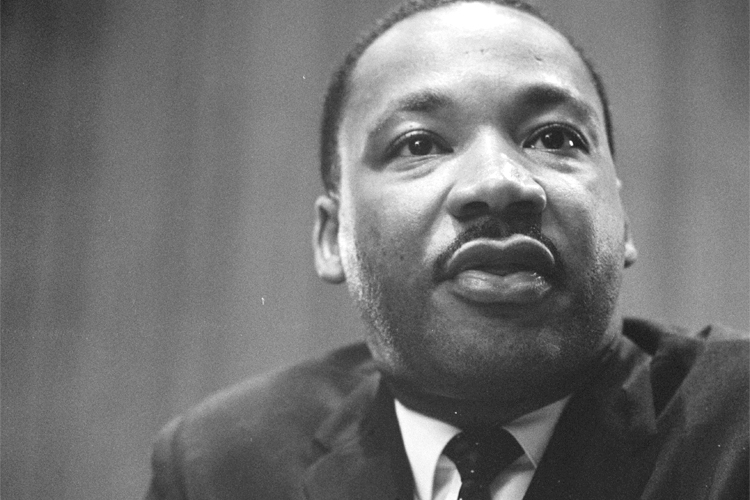 When Martin Luther King Jr. is brought up in a political conversation, it is usually in reference to his work for civil rights…. and if you’re a member of the proverbial one percent, this is definitely for the best. Considering the reverence with which King is held today, it would ill-serve them if the general public remembered him for quotes like this one:
When Martin Luther King Jr. is brought up in a political conversation, it is usually in reference to his work for civil rights…. and if you’re a member of the proverbial one percent, this is definitely for the best. Considering the reverence with which King is held today, it would ill-serve them if the general public remembered him for quotes like this one:
“Capitalism does not permit an even flow of economic resources. With this system, a small privileged few are rich beyond conscience, and almost all others are doomed to be poor at some level. That’s the way the system works. And since we know that the system will not change the rules, we are going to have to change the system.”
This brings me to the Panama Papers. They have been covered in such great detail that there isn’t much new analysis that I can provide here. Suffice to say that they demonstrate, with irrefutable evidence, what the vast majority of leftists have known for decades – that the forces of globalization have allowed the super-wealthy to hide their money from the public. They create fake companies, squirrel away their assets in offshore accounts, and in general show brazen contempt for the rest of us by refusing – absolutely refusing – to pay their fair share in taxes.
For the most part, Americans have been spared from humiliation in the Panama Papers leaks, but this is only because our own tax laws are so rigged that the plutocracy here doesn’t need the assistance of shady Central American law firms. This brings us to the body of economic thought which King left behind, brought to fruition in the last year of his life as the Poor People’s Campaign. Starting in 1967, King pivoted away from his focus on racial inequality, instead arguing that poverty and other forms of economic injustice required more immediate attention. Had he not been assassinated in the spring of 1968, he would have led a massive march on Washington in order to enact his agenda, the “Economic and Social Bill of Rights for the Poor.” These included:
1. A meaningful job “at a living wage” for every employable citizen.
2. A secure and adequate income for all who cannot find jobs, or for whom employment is inappropriate.
3. Access to land as a means to income and livelihood.
4. Access to Capital as a means of full participation in the economic life of America.
5. Recognition by law of the rights of people affected by government programs to play a truly significant role in determining how they are designed and carried out.
6. Recommit the Federal Government to the “Full Employment Act of 1946” and legislate the immediate creation of at least one million socially useful career jobs in public service.
7. Adopt the pending “House and Urban Development Act of 1968.”
8. Repeal the 90th Congress’s punitive welfare restrictions in the “1967 Social Security Act.”
9. Extend to all farm workers the right guaranteed under the “National Labor Relations Act” – to organize agriculture labor unions.
10. Restore budget cuts for bilingual education, Head Start, summer jobs, “Economic Opportunity Act,” and “Elementary and Secondary Education Acts.”
While the details are a bit technical for review in a single op-ed, the underlying principle here was simple and powerful. King understood that any society which permitted vast numbers of people to languish in poverty would, by default, elevate the wealthy to a level of privilege that put them above the law. If money is power, then the only way to prevent the tyranny of wealth is to make sure that no one is so lacking in money as to be disempowered. When that lesson is forgotten, law firms like Mossack Fonseca in Panama are able to thrive.
If history serves as any reliable precedent, the release of the Panama Papers is unlikely to change anything. Outside of that small collection of individuals who dutifully follow politics, the world either won’t notice or won’t care, and anyone not directly implicated in the documents will go on as before. Indeed, even those of us who are familiar with the Panama Papers’ contents won’t make the necessary connections between how the world’s financial elite rigged the system on this occasion and the more systemic injustices identified by King almost half a century ago. It’s easy to be overwhelmed by the magnitude of the various scandals that keep popping up, and to thus overlook how they’re all connected.
Nevertheless, we on the left still need to try. Until the presence of poverty is lumped in the same category as the persistence of racism and sexism – that is, until economic inequality is viewed not as an ineffable reality, but as a profound moral flaw that humanity must collectively address – we will continue to watch as the privileged benefit from a special set of rules that they created for themselves. All of these problems are linked, and if we’re going to unravel the straitjacket of economic oppression, the Panama Papers are as good a thread as any on which to start tugging.
This, I strongly suspect, is how Martin Luther King would have viewed the situation. It’s a shame that so few of us are around to remember his words.

